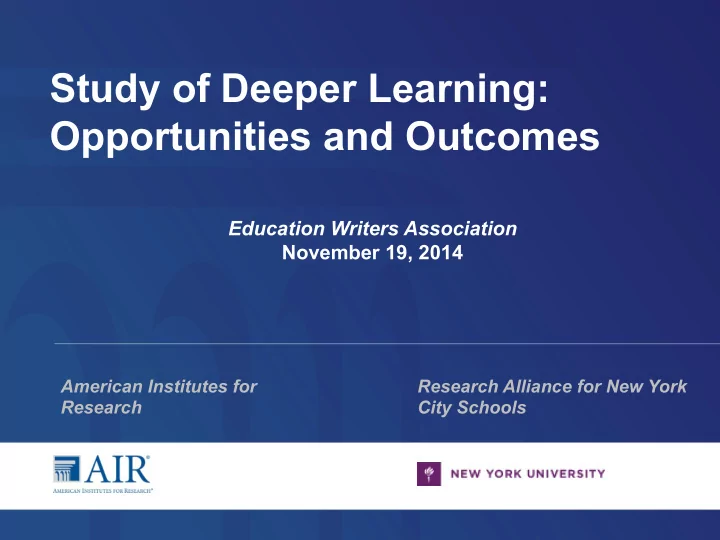

Study of Deeper Learning: Opportunities and Outcomes Education Writers Association November 19, 2014 American Institutes for Research Alliance for New York Research City Schools
Domains of Deeper Learning Competencies COGNITIVE Content knowledge INTRAPERSONAL critical thinking/ learning to learn problem solving academic mindsets INTERPERSONAL communication collaboration
Assumptions Underlying the Deeper Learning Initiative Student School Outcomes Approaches Students’ Experienced Cognitive to Promoting Opportunities Interpersonal and Deeper Learning Intrapersonal To Engage in Strategies Graduation Deeper Learning Structures Postsecondary Cultures Success 3
Design for Test of Concept 1. Examples of the concept: • At least moderate implementers of DL network models • Serve high proportions of traditionally underserved students • Non-selective, whole school 2. Comparison: • What would have happened had the students not attended DL network schools? • Schools serving similar student pop; same jurisdiction and other criteria • Students matched for incoming achievement, characteristics 4
Design 3. Cohort Model • To capture HS and post-HS experiences/outcomes? • 5 successive cohorts of students – defined by entry into G9 • Combination of extant and new data collection 4. Outcomes across each domain • Cognitive: PISA-based Test for Schools (deep content and problem- solving – R, M, S)) State HS Graduation tests (CAHSEE, NY Regents) • Inter- & Intra-personal Competencies: validated student surveys • HS Graduation • Post-secondary matriculation and persistence (NSC) 5
Findings in a Nutshell Higher On-Time Better Assessment Stronger Intrapersonal Graduation Rates Scores and Interpersonal Skills More Likely to Attend 4-Year Colleges Equitable Opportunities and Outcomes 10 http://www.babysfirsttest.org/sites/default/files/HealthcareBaby.jpeg
Report 1: School Approaches Student School Outcomes Approaches Students’ Experienced Cognitive to Promoting Opportunities Interpersonal and Deeper Learning Intrapersonal To Engage in Strategies Graduation Deeper Learning Structures Postsecondary Cultures Success 7
School Approaches to Promote Deeper Learning Competencies in Network Schools § Variation in approach across network schools § Most common strategies and structures: • project-based learning • internship opportunities • collaborative group work • longer-term cumulative assessments • advisory classes and alternative scheduling structures § These strategies and structures were reported to a greater extent in network schools than non-network schools 8
Report 2: Opportunities Student School Outcomes Approaches Students’ Experienced Cognitive to Promoting Opportunities Interpersonal and Deeper Learning Intrapersonal To Engage in Strategies Graduation Deeper Learning Structures Postsecondary Cultures Success 9
Estimated Average Effect of Attending a Network School on Students’ Opportunities for Deeper Learning 10
Report 3: Student Outcomes Student School Outcomes Approaches Students’ Experienced Cognitive to Promoting Opportunities Interpersonal and Deeper Learning Intrapersonal To Engage in Strategies Graduation Deeper Learning Structures Postsecondary Cultures Success 11
Outcomes § Graduation: Students attending network schools had 9% higher rates of on-time graduation compared to similar non-network students. § Post-secondary Attainment: • More likely to attend 4-year colleges; selective institutions • Similarly likely to go on to some kind of post-secondary • Positive effect on initially low-achievers (greater benefit from DL) § Achievement: higher scores on PBTS and high school achievement test scores 12
Cognitive Skill Development: Results 13
Interpersonal and Intrapersonal Competencies: Results § Students in network schools had higher levels of • collaboration skills, • academic engagement, • motivation to learn, and • self-efficacy § Measures of self-management, creative thinking skills, perseverance, and locus of control did not differ between network and non-network students 14
Similar Effects on Low and High Achievers § Effects did not differ between students entering Grade 9 with below-average or above-average test scores for most outcomes § Exception: greater benefit on post-secondary enrollment for initially low achievers. 15
Conclusion § Overall evidence to support concept and assumptions underlying deeper learning initiative. § Confidence in findings: • Based on robust quasi-experimental design, checks and cross- checks • Consistency of findings • Connection between DL opportunities and outcomes holds at both the school and individual student level 16
Opportunities and Outcomes for Individual Students Motivation to Learn 17
For additional information please contact: Catherine Bitter, Deputy Director cbitter@air.org Jennifer O’Day, Co-Principal Investigator joday@air.org Mike Garet, Co-Principal Investigator mgaret@air.org Marc Chun, Hewlett Foundation mchun@hewlett.org 1000 Thomas Jefferson Street NW Washington, DC 20007 General Information: 202-403-5000 TTY: 887-334-3499 www.air.org 18
Recommend
More recommend